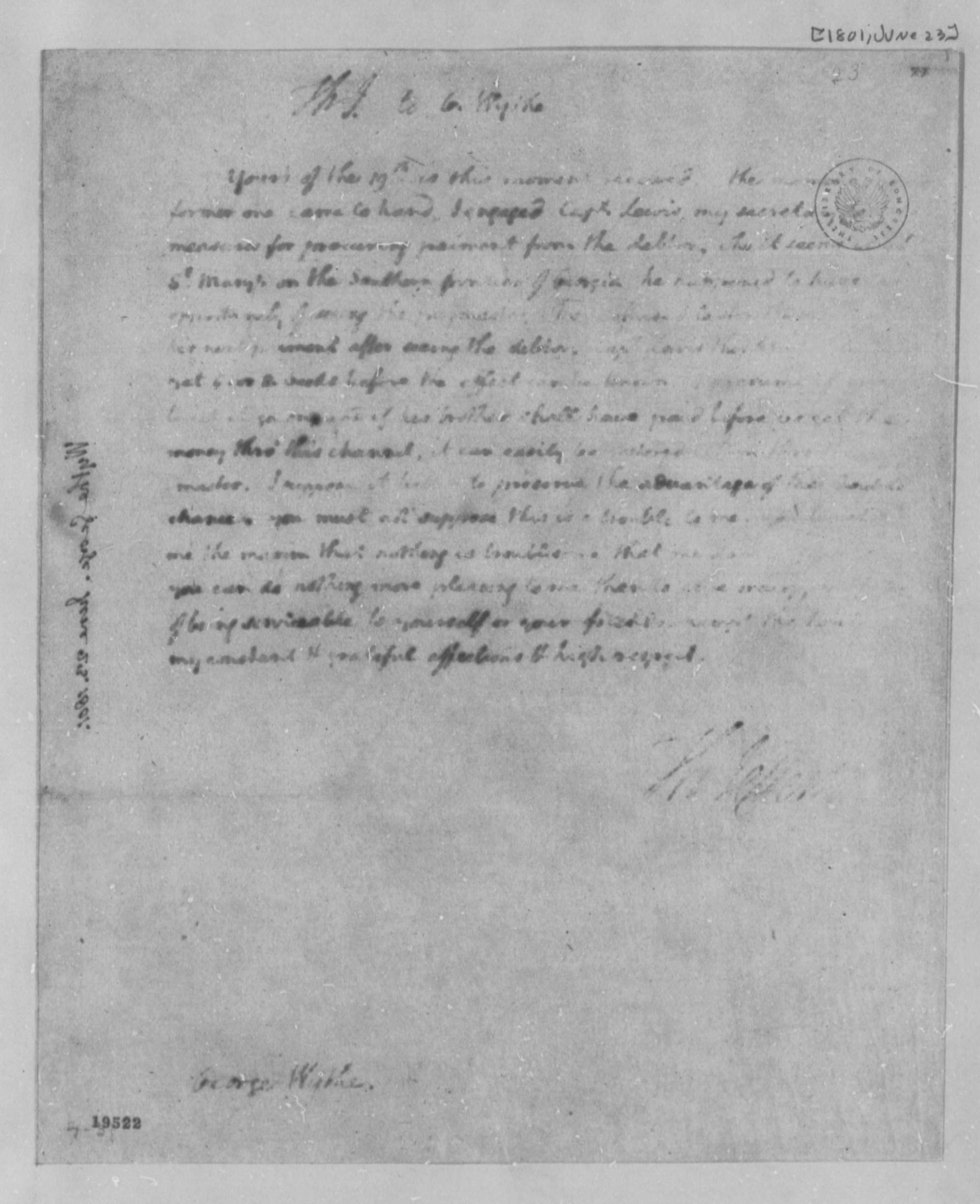Thomas Jefferson to Wythe, 23 June 1801: Difference between revisions
No edit summary |
mNo edit summary |
||
| (13 intermediate revisions by 5 users not shown) | |||
| Line 1: | Line 1: | ||
[[File:JeffersonToWytheJune231801.jpg|right|thumb| | [[Thomas Jefferson]] says that he received [[George Wythe|Wythe]]'s letter from [[Wythe to Thomas Jefferson, 19 June 1801| June 19]] at the same time as the first letter Wythe sent regarding the same subject. Jefferson had his secretary, [[Wikipedia: Meriwether Lewis| Captain Lewis]], take measures to get the payment from the debtor who was located on the southern frontier of Georgia. He says that the payment should take around 6 or 8 weeks if the debtor did make the payment.<ref>Note: In certain areas of Jefferson's letter, the writing is either faint or missing making it illegible, as indicated by [...].</ref> | ||
[[File:JeffersonToWytheJune231801.jpg|right|thumb|300px|"Thomas Jefferson to Wythe, 23 June 1801." Image from the [http://hdl.loc.gov/loc.mss/mtj.mtjbib010223 Library of Congress,] ''The Thomas Jefferson Papers.'']] | |||
==Letter text== | |||
<blockquote> | |||
:::::Th J. to G. Wythe | |||
Yours of the [[Wythe to Thomas Jefferson, 19 June 1801|19th]] is this moment received, the moment your former one came to hand. I engaged Capt. Lewis, my secretary, to take measures for procuring paiment from the debtor, who it seems is at St. Mary’s on the Southern frontier of Georgia, he happened to have opportunity of seeing the paymaster who refused to stop […] his next paiment after seeing the debtor. Capt. Lewis thinks […] yet 6. or 8. weeks before the effect can be known. I presume […] to let it go on. and if his brother shall have paid before we get the money thro’ this channel, it can easily be restored to him thro the paymaster. I suppose it better to preserve the advantage of the […] chance. you must not suppose this is a trouble to me. you taught me the maxim that nothing is troublesome that we do [willingly].<ref>Based on other letters and lists of aphorisms compiled by Jefferson, the last word is almost certainly "willingly." See "[https://founders.archives.gov/documents/Jefferson/03-16-02-0410Thomas Jefferson to Charles Wilson Peale, 20 December 1820]," Founders Online, accessed March 17, 2025 and "[https://tjrs.monticello.org/letter/216 Extract from Thomas Jefferson to Cornelia J. Randolph: "a dozen Canons of conduct in life]," the website for Thomas Jefferson's Monticello, accessed March 17, 2025, citing "Thomas Jefferson to Miss Cornelia Randolph at Dr Bankhead's Port Royal, [n.d.]", University of Virginia, Thomas Jefferson Papers.</ref> you can do nothing more pleasing to me, than to give me opportunity of being serviceable to yourself or your friends. accept the […] my constant & grateful affections & high respect.<br /> | |||
<div align="right"> | |||
Th: Jefferson | |||
</div> | |||
</blockquote> | |||
==See also== | |||
*[[Wythe to Thomas Jefferson, 19 June 1801]] | |||
*[[Wythe to Thomas Jefferson, 31 July 1801]] | |||
==References== | |||
<references/> | |||
==External links== | |||
*[https://founders.archives.gov/documents/Jefferson/01-34-02-0337 "From Thomas Jefferson to George Wythe, 23 June 1801,"] Founders Online, National Archives. | |||
[[Category: Letters to Wythe]] | [[Category: Letters to Wythe]] | ||
[[Category: Letters and Papers]] | |||
Latest revision as of 12:19, 26 March 2025
Thomas Jefferson says that he received Wythe's letter from June 19 at the same time as the first letter Wythe sent regarding the same subject. Jefferson had his secretary, Captain Lewis, take measures to get the payment from the debtor who was located on the southern frontier of Georgia. He says that the payment should take around 6 or 8 weeks if the debtor did make the payment.[1]

Letter text
- Th J. to G. Wythe
Yours of the 19th is this moment received, the moment your former one came to hand. I engaged Capt. Lewis, my secretary, to take measures for procuring paiment from the debtor, who it seems is at St. Mary’s on the Southern frontier of Georgia, he happened to have opportunity of seeing the paymaster who refused to stop […] his next paiment after seeing the debtor. Capt. Lewis thinks […] yet 6. or 8. weeks before the effect can be known. I presume […] to let it go on. and if his brother shall have paid before we get the money thro’ this channel, it can easily be restored to him thro the paymaster. I suppose it better to preserve the advantage of the […] chance. you must not suppose this is a trouble to me. you taught me the maxim that nothing is troublesome that we do [willingly].[2] you can do nothing more pleasing to me, than to give me opportunity of being serviceable to yourself or your friends. accept the […] my constant & grateful affections & high respect.
Th: Jefferson
See also
References
- ↑ Note: In certain areas of Jefferson's letter, the writing is either faint or missing making it illegible, as indicated by [...].
- ↑ Based on other letters and lists of aphorisms compiled by Jefferson, the last word is almost certainly "willingly." See "Jefferson to Charles Wilson Peale, 20 December 1820," Founders Online, accessed March 17, 2025 and "Extract from Thomas Jefferson to Cornelia J. Randolph: "a dozen Canons of conduct in life," the website for Thomas Jefferson's Monticello, accessed March 17, 2025, citing "Thomas Jefferson to Miss Cornelia Randolph at Dr Bankhead's Port Royal, [n.d.]", University of Virginia, Thomas Jefferson Papers.
External links
- "From Thomas Jefferson to George Wythe, 23 June 1801," Founders Online, National Archives.